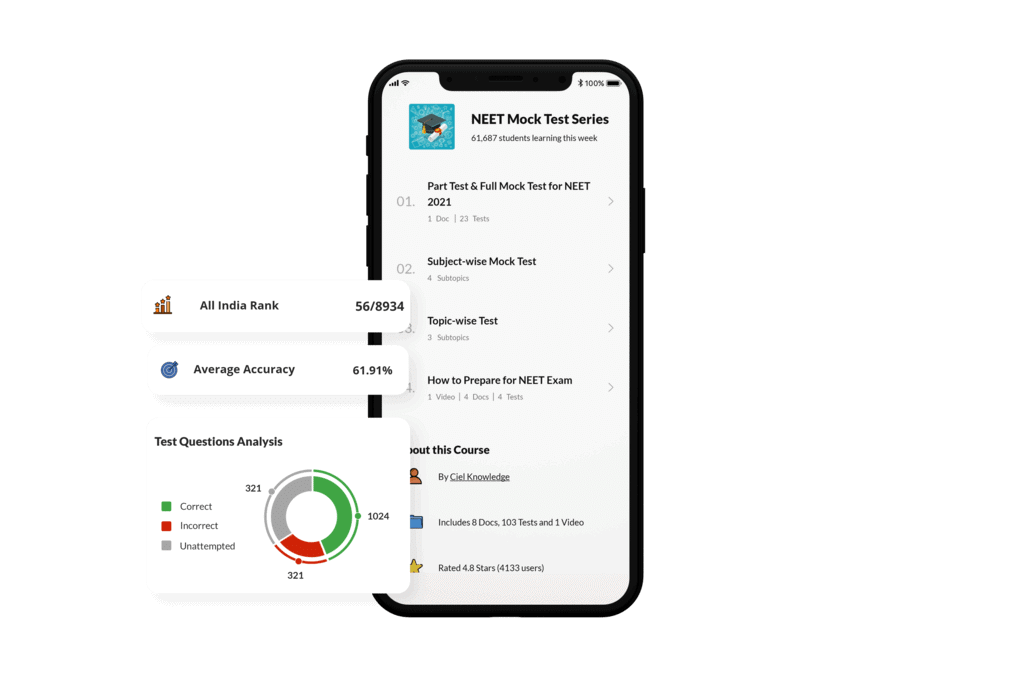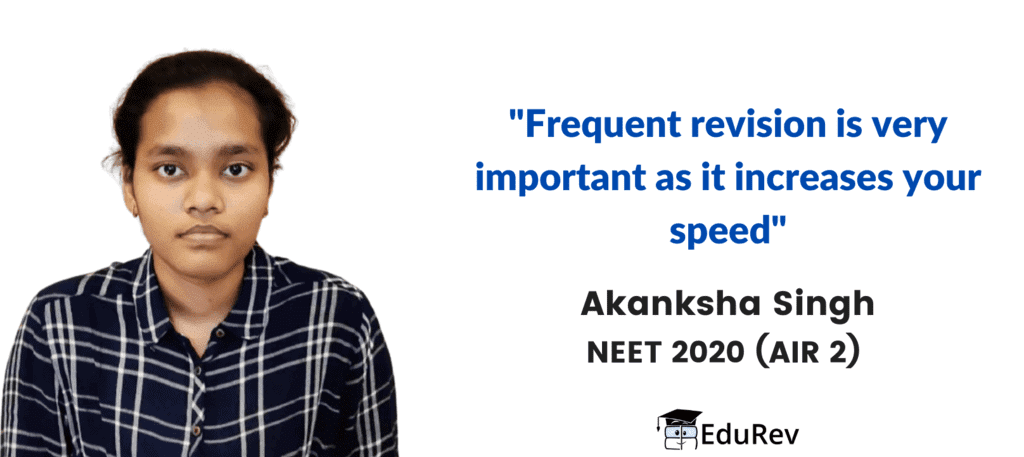How to Prepare for NEET Chemistry with EduRev? | Chemistry Class 12 PDF Download

NEET Chemistry is divided into three sections, namely, Physical, Organic and Inorganic Chemistry. It has been observed that most of the questions are theory-based and can be solved by those who have read the NCERT books thoroughly in Chemistry.
Step 1: Decode the Exam Pattern and syllabus
- Exam Pattern: Chemistry will have 2 sections i.e. A and B containing 35 and 15 questions respectively. However, while attempting questions asked in Section B candidates can choose to attempt any 10 Questions out of 15.
- Chemistry Syllabus for NEET: The NEET Chemistry syllabus carries an equal distribution of questions from Class 11 and Class 12. It comprises around 21 chapters from the curriculum of Class 11 and 12 combined. EduRev provides you with the complete syllabus information you can click here to go through it.
- NCERT Importance: In Physical chemistry, NCERT is not that much important. But for Inorganic Chemistry, NCERT is important and is the most vital source. In Organic chemistry - Nomenclature, Isomerism is the base and NCERT must be done thoroughly for them.
NEET Chemistry Syllabus Topics
(i) Class 11th Syllabus
- Some basic concepts of Chemistry
- Structure of atom
- Classification of Elements and Periodicity in Properties
- Chemical Bonding and Molecular structure
- Thermodynamics
- Equilibrium
- Redox reactions
- Some p-Block elements
- Organic Chemistry – Some basic principles and techniques
- Hydrocarbons
(ii) Class 12th Syllabus
- Solutions
- Electrochemistry
- Chemical Kinetics
- p Block elements
- d and f block elements
- Coordination compounds
- Haloalkanes and Haloarenes
- Alcohols, Phenols, and Ethers
- Aldehydes, Ketones and Carboxylic Acids
- Organic compounds containing Nitrogen
- Biomolecules,
Step 2: Make a list of the most Important Topics
- In Chemistry, some topics become very important as questions come from them directly, so it becomes necessary to practice those topics as much as you can.
- Thermodynamics, Equilibrium, Purification, Biomolecules, p Block elements, Isomerism, Nomenclature, Inorganic bonding chapter, and Redox Reactions are the important chapters from Chemistry.
Step 3: Start building your concepts from NCERTs

- Read theory carefully: Theory is the most important aspect as it will help in building the concepts, solving questions after reading will make you better at it. For concepts and questions, EduRev has compiled a complete course of Chemistry Class 11 & Chemistry Class 12. This course provides you with 400+ tests to attempt to complete chapters as well as topic-wise tests are also available. The theory is available in the form of precise docs and videos by the best faculty.
- Important chapters: Biomolecules and organic chemistry & inorganic chemistry must be done from NCERT. You can find the NCERT books for all the chapters of chemistry on the EduRev platform, click here to read.
- Importance of NCERT: NCERT is very important for Organic and inorganic Chemistry. You should read each and every line from it and do all the questions given in the book.
- Learn Formulas by heart: All formulas should be on the tips. Collect all formulas in one single place. It will help you while doing questions as well as you can go through the formulas altogether any time you want.
- Attempt PYQs: Analyse questions through PYQs and mark those concepts in which you are weak. When you know what are your weak areas, without waiting for anything else you should start working on it. You can start attempting PYQs subjectwise right now from the EduRev platform, click here.
- Important chapters of Inorganic Chemistry: Chemical bonding + Periodic table cover 50% of inorganic chemistry, revise this through NCERT and do lots and lots of questions as well. You can also read concepts and practice questions from here for both Chemical Bonding and Periodic table. EduRev has compiled very concise notes based on NCERT so it will help you to cover the chapters in less time and with more understanding.
- Named reactions: In Organic chemistry, reactions given in NCERT should be at the fingertips of the aspirants preparing for NEET chemistry. Named reactions along with their mechanisms are important and are mentioned in NCERT. You must learn them by heart.
- Mind maps can help you a lot in understanding and remembering things, you can go through mindmaps of chemistry, which EduRev has provided, which are completely based on NCERT.
Step 4: Make short notes from NCERT for quick revision
- Mind maps: You should make your own notes of NCERT for referring again and again. Revision can be done through mind maps also. EduRev gives the opportunity of chapter-wise mind maps which aids in better planning. Check it out here.
- Tables and charts: According to toppers, you should make short notes in tabular form which makes memorizing easy and effective. The IUPAC names in organic chemistry, the periodic table in inorganic chemistry, and formulae in physical chemistry are really important and should be at your fingertips. Note them down on paper and keep them handy.
- Make notes: Try making notes in the side margin of the NCERT textbook so that the important points do not get missed out while revision. Also, if while studying, a doubt arises in your mind, note it down in the side margin. In this way, that doubt is cleared in your mind every time you do a revision.
Step 5: Practice, Practice & Practice!

- By reading and practicing more, you will strengthen your concepts.
- Practice NCERT questions for Chemistry. You can practice exercise questions (with solution) and exemplar problems (with solutions) from EduRev also, click here for Chemistry Class 11 & Chemistry Class 12.
- You can practice and revise notes, videos, and tests from the EduRev course of Chemistry Class 11 & Chemistry Class 12 which is entirely based on NCERT.
Practice topic-wise tests: Practice topic-wise tests of Chemistry as soon as you complete any topic and you want to test yourself. You can find the link for Chemistry topic-wise tests here, Chemistry Class 11 & Chemistry Class 12.
- Practice chapter-wise tests: After the completion of the chapter, practice chapter-wise tests. Practicing chapter-wise tests will check your knowledge and understanding for the entire chapter. You can find the link chapter-wise here: Chemistry Class 11 & Chemistry Class 12.
- Practice subject-wise tests: Whenever you feel that you have prepared enough for Chemistry, you can start giving Chemistry subject-wise mocks right then. You can start your practice right now by clicking here.
- Attempt PYQs: You must solve PYQs for a better understanding of the question type and pattern. You can start practicing with Subject wise PYQs, as well as with 31 Year Chapter-wise Chemistry PYQs.
Step 6: Take up Mock Test and PYQs
- For checking the level of your preparation you should start attempting mock tests, even if your preparation is completed just for one subject, you should start attempting subject mocks. EduRev provides you with Chemistry Subjects Mocks for your excellent practice in Chemistry.
- When you are attempting complete mocks, you will start learning the management of time as well as the discipline to sit straight for 3 hours. For complete mocks click here.
- You must mark the important and tricky questions while attempting the mocks and go back to them from time to time.
- PYQs are important, You must give lots of previous year question papers so that you will get yourself inlined with the pattern and type of questions coming in NEET Chemistry. You can find the previous 10 years question papers on the EduRev platform, click here. As well as you will also find Chemistry PYQs of 31 years on our platform, click here.
- Arrange OMR, give mock tests on that, and attempt a full paper combined with all subjects.
EduRev provides All India Rank (AIR) & in-depth analysis after every test that you attempt. You also get to know the average time taken by the students across the country to attempt a particular question. Continuous analysis & improvement is really important for every NEET aspirant.

Step 7: Finish the syllabus and start revision before 6 months of the exam

- Do frequent revision of NCERT Chemistry. To read, click here.
- You can also revise chemistry through NEET Revision notes of EduRev, which are made in reference to NCERT.
While revising, you may come up with doubts, do not leave them without clearing.
Write extra content or questions along margins in NCERT so that doing revision will be easy.
Revision of your own notes can help you a lot, so revise as much as possible.
Revise important formulas and named reactions of organic chemistry again and again from your formula book.
Revise through PYQs and master the subject by revising more and more. You can attempt Subject wise PYQs of chemistry from EduRev as well as you can attempt 31 Year Chapter-wise Chemistry PYQs of chemistry from EduRev.
Additional Information
1. Overall Understanding of the Exam
Check out these documents and prepare your strategy for NEET accordingly
- NEET Syllabus 2022, Important Chapters and Cut-Off
- How to Prepare for NEET with EduRev?
- Importance of NCERT for NEET
2. Checkout Subject-wise Strategy
|
108 videos|287 docs|122 tests
|
FAQs on How to Prepare for NEET Chemistry with EduRev? - Chemistry Class 12
| 1. How can I decode the exam pattern and syllabus for NEET Chemistry? |  |
| 2. What are the most important topics to focus on while preparing for NEET Chemistry? |  |
| 3. How can I build my concepts in NEET Chemistry using NCERT textbooks? |  |
| 4. Why is practice important while preparing for NEET Chemistry? |  |
| 5. When should I start revising for NEET Chemistry? |  |
























